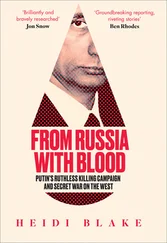By October 2003, Curtis had been working for Khodorkovsky for six years when his billionaire client was arrested at gunpoint in central Siberia for alleged massive tax evasion and fraud. A month later the Mayfair lawyer found himself further embroiled in the conflict when he was appointed chairman of the Gibraltar-based Menatep, the bank that controlled Yukos, Khodorkovsky’s $15 billion oil company. Russian newspapers suddenly began referring to a ‘mystery man’ in Gibraltar who controlled Russia’s second-biggest oil producer. Billions of pounds were at stake, the political survival of Putin was in the balance, and Curtis was billed to play a pivotal role in the forthcoming court drama.
In March 2004 the trial of Khodorkovsky was imminent and the pressure on Curtis was intense. On the morning after his death on 3 March, the offices of two Swiss companies connected to Yukos were raided by Swiss police at the request of the Russian prosecutors. Documents were seized, suspects were interviewed in Geneva, Zurich, and Freiberg, and Swiss bank accounts containing $5 billion were frozen.
Moreover, just a few weeks earlier Curtis had taken another critical and high-risk decision: to cooperate covertly with British police officials. Until only recently a back-room lawyer (secretive, low profile, discreet), he found himself suddenly thrust into the spotlight as chairman of a highly controversial Russian company. Sensitive and highly strung at the best of times, he felt increasingly exposed in this new role. Sooner or later he feared the Russian authorities would come knocking on his door asking questions about his own role in alleged tax avoidance and the filtering of cash out of the country.
As he was legally obliged, Curtis had been scrupulous in reporting ‘suspicious transactions’, or the merest hint of criminal activity, to the National Criminal Intelligence Service (NCIS) at Scotland Yard, which investigates money laundering and organized crime. In May 2003, for example, he had filed a suspicious transaction report about one of his Russian clients. Now he needed protection for another reason: he feared that he might become the target of commercial enemies – rival oil companies and minority investors of Yukos who claimed that they were being defrauded. He also knew that contract killings in Russia were commonplace. ‘I have dug myself into a hole and I am in too deep,’ he told a colleague. ‘I am not sure that I can dig myself out.’
In the last few weeks of his life Curtis was under constant surveillance by commercial and Russian state investigators and was considering moving offices. His telephones were tapped and in early 2004 his security consultants discovered a small magnet used to secure a listening device at his country home in Dorset. According to Eric Jenkins, an uncle who often visited him in Gibraltar, where his nephew lived for most of the year, Curtis received numerous anonymous threats and intimidating phone calls. He took them seriously enough to hire a bodyguard. ‘There certainly were death threats against Stephen,’ confirmed Nigel Brown, whose company also provided security for Curtis’s clients Berezovsky and Khodorkovsky. ‘The timing of his death was very suspicious and there were people out there who had a motive to kill him. He just knew too much.’
At first Curtis dismissed the threats, but when one phone call mentioned his wife and 13-year-old daughter, he decided to act. In mid-February 2004, deeply worried, he approached the Foreign Office and NCIS and offered full but covert cooperation. He would provide information about Russian commercial activities in Britain and the oligarchs’ assets, in return for protection for himself and his family. Up to that point his relationship with NCIS had been a limited, almost standard form of cooperation, a role many solicitors play. For NCIS Curtis was a potentially prized informant with insider knowledge of controversial Russian business activity in London. He was immediately assigned a controller, but after only two meetings the NCIS officer was transferred to another operation. Curtis asked to be assigned another controller but before this was done, he was dead.
A week before the fatal crash Curtis had told a close friend at his apartment at Waterside Point, ‘If anything happens to me in the next few weeks, it will not be an accident.’ He had laughed nervously but he was not joking. He had played the messages left on his mobile phone to colleagues at his law firm. ‘Curtis, where are you?’ asked a voice with a Russian accent. ‘We are here. We are behind you. We follow you.’ At the inquest his uncle, Eric Jenkins, testified that his nephew had repeated the same words of warning to him.
The frequent threats convinced some of Curtis’s colleagues and relations that he was murdered. ‘Definitely’, one former employee of his law firm claimed. ‘It was done by remote control. They knew about his flight plans in advance because they were tapping his phones.’ Dennis Radford, the father of the pilot, told the subsequent inquest that he did not think that the Air Accidents Investigation Branch (AAIB) had properly investigated the possibility of foul play. ‘The lack of security at Bournemouth Airport is such that, had anybody wished to sabotage the aircraft, they would have unchallenged and unrestricted access for that purpose,’ he said.
Witnesses say that they heard an unexplained and incredibly loud bang just before the crash. ‘I heard a kind of thump noise and the dog started barking, so I came outside and I heard another couple of bangs. It made a particularly harsh noise, as if the engine was malfunctioning,’ Jack Malt, who lives near the crash site, testified at the inquest. ‘There was a period of silence in the moments before the explosion so I guess the engines must have cut out,’ said Sarah Price, who lives 300 yards from the site of the crash. She also heard a massive bang just before the explosion. And Gavin Foxwell, another local resident, told the inquest that the helicopter made ‘a stuttering, unusual sound, as if it was struggling to stay aloft’.
The death of Stephen Curtis remains a mystery to this day. However, no credible evidence of sabotage or murder has ever been discovered. The investigation by the AAIB concluded:
The possibilities of unauthorised interference were considered. An improvised explosive device could have been positioned in the cabin or the baggage hold. All cabin doors at the undamaged skin of the baggage door were, however, recovered from the accident site. No evidence of damage other than consistent with ground impact was found on any of them. In particular no high velocity particle impacts were noted in any of these door components.
At the inquest Paul Hannant, the Senior Inspector of the AAIB, said, ‘If you are going to bring an aircraft like this down, you have either got to destroy the main rotor system or interfere with the main gearbox. The only other real way is to interfere with the controls. If you disconnect the controls, that would be immediately apparent to the pilot… Any attempt to use a corrosive device or a remote control device would also have been apparent to Captain Radford.’
Ultimately, deteriorating weather conditions and pilot inexperience were blamed for the crash. According to the AAIB inspector, ‘The most likely cause of the accident was that Captain Radford became disorientated during the final stages of the approach to Bournemouth Airport.’ Yet, while the weather on the fateful night of 3 March 2004 was poor – light drizzle, broken cloud, and overcast sky – flying conditions were not especially hazardous. As his father Dennis later claimed, ‘Max had flown many, many times in considerably worse conditions than that. And if he became disorientated, why was he on the radio describing the runway and talking to the control tower twenty-nine seconds before the crash?’
Читать дальше
Конец ознакомительного отрывка
Купить книгу












